Wainhouse Tower
A victorian "Folly"
_1.jpg)
Wainhouse Tower is a folly in the parish of King Cross, on the south-west side of Halifax. At 275 feet (84 m), it is the tallest structure in Calderdale and the tallest folly in the world. It was erected in the four years between 1871 and 1875. The main shaft is octagonal in shape and it has a square base and 369 steps leading to the first of two viewing platforms, and a total of 405 to the top viewing platform. The lower platform is open to the public during summer bank holidays. The Tower is a Grade II* listed building.
There is a popular urban myth that the reason behind the erection of the viewing platforms was a long-standing feud between landowning neighbours John Edward Wainhouse (1817–1883) and Sir Henry Edwards (1812–1886). Edwards had boasted that he had the most private estate in Halifax, Pye Nest (demolished 1925-30), into which no one could see. As the estate was on land adjacent to the chimney's site, following the opening of the viewing platforms, Edwards could never claim privacy again.
The tower was designed by architect Isaac Booth as a chimney to serve the dye works owned by Wainhouse. The height of the chimney was to satisfy the Smoke Abatement Act of 1870 which required a tall chimney to carry smoke out of the valleys in which the factories were built. A much simpler chimney would have satisfied the requirements, but Wainhouse insisted that it should be an object of beauty.
In 1874, John Wainhouse sold the mill to his works manager, who refused to pay the cost of the chimney's construction, so Wainhouse kept the tower for himself and used it as an observatory. Booth left after a dispute and was replaced by another local architect, Richard Swarbrick Dugdale, who is responsible for the elaborate galleries and the corona dome at the top. The tower was completed on 9 September 1875, at a cost of £14,000 (equivalent to £1,400,000 in 2021).
In 2006, Wainhouse Tower was closed because of safety problems. Work to repair it began in July 2008 and took about five months. During the restoration, the top section of the tower was partly dismantled and rebuilt, decorative sections and part of the main shaft were repointed, missing stone finials replaced, the drainage system improved, corroded ironwork replaced and cracks at the base of the tower fixed. The tower reopened to the general public on 4 May 2009. Restoration cost £400,000.
Since the millennium celebrations in 1999/2000, the galleries and corona of the Tower have been illuminated. The colour scheme varies according to the event which is being recognised, although since 24th February 2021 the predominant colour scheme has been the blue over yellow of Ukraine. The lights were turned off during the period of National Mourning for HM Queen Elizabeth II.
In 2011, the Huffington Post included the tower in its list of the "Top 10 Pieces of Folly Architecture," and The Telegraph included the tower on their top 15 list of "Britain's Best Architectural Follies"
With thanks to Wikipedia and Calderdale Council
Related pages...
Calderdale Royal Hospital
more The main Hospital for the the town
Shaw Lodge Mills
more A brief history of this icon of the textile industry in the Halifax area

The Shay Stadium
more The home of professional sport in the town

Eureka! The National Children's Museum
more A popular children's museum
The Halifax Building Society
more Headquarters of the eponymous financial institute
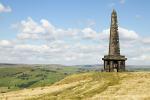
Stoodley Pike
more A war memorial in the Todmorden area
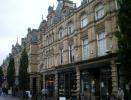
The Halifax Borough market
more The victorian covered market in the town centre
_1.jpg)
Square Church Spire
more The spire is all that remains of this church
_1.jpg)
The Piece Hall
more Halifax's jewel in the crown
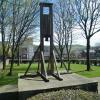
The Halifax Gibbet
more A forerunner of the Guillotine
Halifax Town Hall
more Seat of Local Governance

Halifax Minster
more The centre of worship in Town

Dean Clough
more An industrial powerhouse of the past
_1.jpg)
All Souls Church
more The church of a former model village
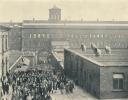
Black Dyke Mills
more An icon on the outskirts of Halifax
back to page above this...
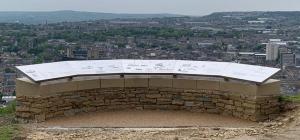
The Centenary Viewing Platform at Beacon Hill
back To celebrate 100 years of service to the town of Halifax we have commissioned viewing platform on Beacon Hill overlooking the town. Situated on the Magna Via, an old packhorse route, the walk to the top is worth it.